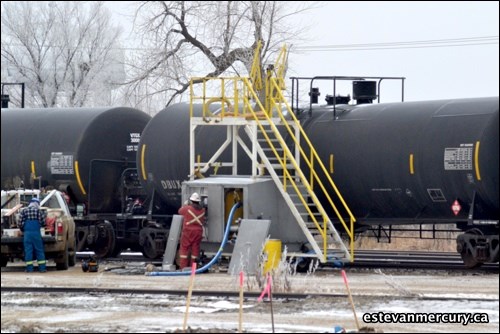In what is quickly becoming a sign of the times for the oil industry, Canadian Pacific Railway has announced it will soon be shipping oil via rail from a transload facility located in Estevan.
The facility, which is located on CPR's property in the city, will have the capacity to load up to 15 tankers of oil per day when operating at its full capacity. It's expected that only a "handful" of cars will be loaded in the early stages of this new venture which the company says will allow them to provide crude shippers in the Bakken region with flexible and reliable supply chain options in a time when there is growing concern about the capacity of the local pipeline network.
"The activity in the Saskatchewan Bakken is increasing to the point where we feel it makes business sense to begin moving crude by rail directly out of that area," said CPR spokesman Ed Greenberg in an interview Thursday.
The transload facility will be operated by Bulk Plus Logistics which is based in Burlington, Ont. and has locations throughout Canada and the United States. Greenberg said semis travelling to off-load their shipments of crude will access the site by using the road that runs parallel to the north set of railway tracks on Kensington Avenue.
"We have what we call a portable pumper that will move the product into the rail car," said Greenberg, who noted each rail car can hold roughly 650 barrels of oil. "This is a facility where the maximum is, potentially, 15 rail cars a day. It's already in place in the middle of our yard. There is no big giant tower or pipelines running all over the place. I would say it is an efficient set up for us to safely and effectively move Saskatchewan Bakken crude into our rail cars for shipping."
Asked about the safety of having a loading site located in what is essentially the centre of the city, Greenberg said safety is CPR's core value in any product they transport.
"Everything that we do in terms of moving any product, be that grain or potash or crude is done with protocols and procedures that meet or exceed the regulations that are in place. When it comes to moving crude, there are no fumes, it is a very clean transfer of product from a truck to rail car and it done in a very safe and efficient manner."
The safety of the site is also a concern to the City of Estevan and its safety personnel. Mayor Gary St. Onge said they have been in contact with CPR about the facility and have been assured that all measures are being taken to ensure the safety of residents.
"Some of our people are concerned about H2S (gas) and (a CPR official) told me that is why they use that pump, there is no venting and there should be no odour ever," said St. Onge who was also told by CPR that an environmental study is also being carried out. "We will go on the advice of our fire department. If they say we've got to put a roadblock up and try and stop this, then I guess we would. We'll see what happens in the next few days. Their people will be contacting our (fire department) and we'll see what they can find out and whether there is a concern or not."
St. Onge said the City will also be monitoring the traffic situation on the already busy Kensington Avenue.
Greenberg said he could not provide a number on how many trucks per day would be accessing the site.
As for the future of the facility, Greenberg said that will be driven by customer demand and did not close the door on the possibility that it could be expanded to service more trains.
"We see energy as a growth market for Canadian Pacific and the Bakken formation in North Dakota and Saskatchewan are very positive for the future. We are starting at this point and seeing where it goes from here.
"Every time we put in a facility it is scaleable to address the current needs of the shipper and as we move forward we gauge that and we determine at this time if we need to take additional steps so we can handle more customers shipments. At this time we are starting with a facility that can transload a maximum of 15 cars a day. As for the future we will be addressing that as we move forward with our customers and shippers to see if that is required."
Once placed on rail cars the crude loaded at the transload facility will be shipped to refiners in Eastern Canada, the Midwestern United States and the U.S. West Coast. According to a report in the Dec. 15 Globe and Mail, Cenovus Energy will be among the companies transporting oil at the Estevan site.




